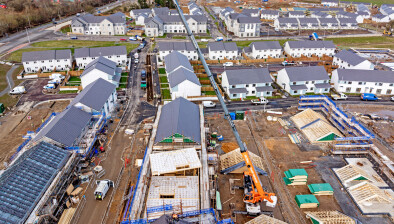Aberdeen retailer fails to establish extended road maintenance duty for council
An Aberdeen-based kilt shop has lost its challenge against the local authority in respect of water ingress problems affecting its premises.

McCalls Ltd raised the petition for judicial review of the failure by the road authority, Aberdeen City Council, to maintain Bridge Street, Aberdeen, where the shop is located.
The appeal was heard by the Lord Justice Clerk, Lady Dorrian, sitting with Lord Brodie and Lord Woolman.
Continuing water damage
Bridge Street runs uphill from the vicinity of Aberdeen Railway Station to its junction with Union Street. Parts of the petitioner’s premises were located within the vaults formed by the arches of the bridge which makes up Bridge Street and carries the public road. Neither the petitioner nor the respondent was able to identify the present owner of the bridge’s arches.
The petitioner averred that the parts of its premises located within the vaults had been subject to high levels of water ingress for many years, with the most likely explanation being that the water was coming down through the structure of the bridge.
In 2005 the respondent undertook works on Bridge Street, including the installation of a membrane under part of the surface of the road, which was of beneficial effect for a time but later deteriorate due to works on utilities running under the road. The premises were flooded in 2015, which led the petitioner to implement a £30,000 scheme of defensive works in addition to restoration costs.
An inspection of the bridge by the respondent in 2016 noted that there was evidence of water ingress through the arch, however the bridge itself was found to be in relatively good condition.
The petitioner continued to experience damaging water ingress and commissioned a drainage impact report which concluded that it was likely that surface water from the road was entering the premises and recommended the installation of additional gullies on Bridge Street. The report also recommended improvements in relation to the cleaning of gullies and the installation of another waterproof membrane.
Following correspondence between the petitioner and the respondent, the respondent affirmed that responsibility for the maintenance of the arches of the bridge rested with the owner, as the current level of water ingress was not detrimental to the bridge.
The petition was lodged in June 2018, seeking declarator that the respondent misconstrued its statutory duty under the Roads (Scotland) Act 1984. The Lord Ordinary who heard the petition at first instance held that the respondent did not need to do anything other than what was necessary to keep the road itself in a proper state of repair.
The petitioner advanced twelve grounds of appeal, among them that the Lord Ordinary had erred in that interpretation of the scope of the respondent’s duties. It was submitted that the duty required the roads authority to have regard to the actual or potential impact of the condition of the road on premises in the vicinity of the road and on the owners and occupiers of relevant premises.
Nothing of legal significance to reduce
The opinion of the court was delivered by Lord Brodie. Addressing the correspondence between the parties and whether it amounted to a decision by the authority, he said: “The letter of 6 March 2018 can be regarded as a refusal to do what the petitioner had called upon the respondent to do, but it is not a decision in the sense of a determination having an impact on any party’s rights or duties. It is simply an item of correspondence. There is therefore no need to reduce it, if only because there is nothing of legal significance to reduce.”
On the duty of the respondent to maintain the road, he said: “The respondent has carried out inspections, in 2016 and in 2018, and concluded that nothing need be done. Given that it is conceded by the petitioner that whether the road, including the drains serving the road surface, is not in good order and repair and, if so, what is to be done about it, are matters for the respondent, we found it somewhat difficult to understand how it could be said that the respondent was in breach of its duty, even if the way in which the petitioner formulates the duty is accepted.”
Of the scope of the respondent’s obligations, he said: “The petitioner seeks to introduce, as a component within the section 1(1) duty to maintain roads, a duty to have regard to or to take into account the possibility of doing works for the benefit of neighbouring properties. We immediately accept that a road authority has powers to carry out works which may have the result of benefiting neighbouring properties. But that is very different from the authority having a duty to keep the possibility in mind whenever maintenance of the road is under consideration.”
He continued: “The petitioner argues that there is nothing in the Act which is inconsistent with the duty it proposes. That might be so, but that is an inadequate basis upon which to impose a duty upon a local authority. We accept as a matter of generality that there are circumstances in which conferring a statutory power will imply the imposition of a duty to exercise that power, but we do see that to be the situation here and we did not understand it to be really argued that it was. In our opinion there is nothing in the statute which supports the petitioner’s construction. The supposed duty simply does not exist.”
For those reasons, the petitioner’s reclaiming motion was refused.














